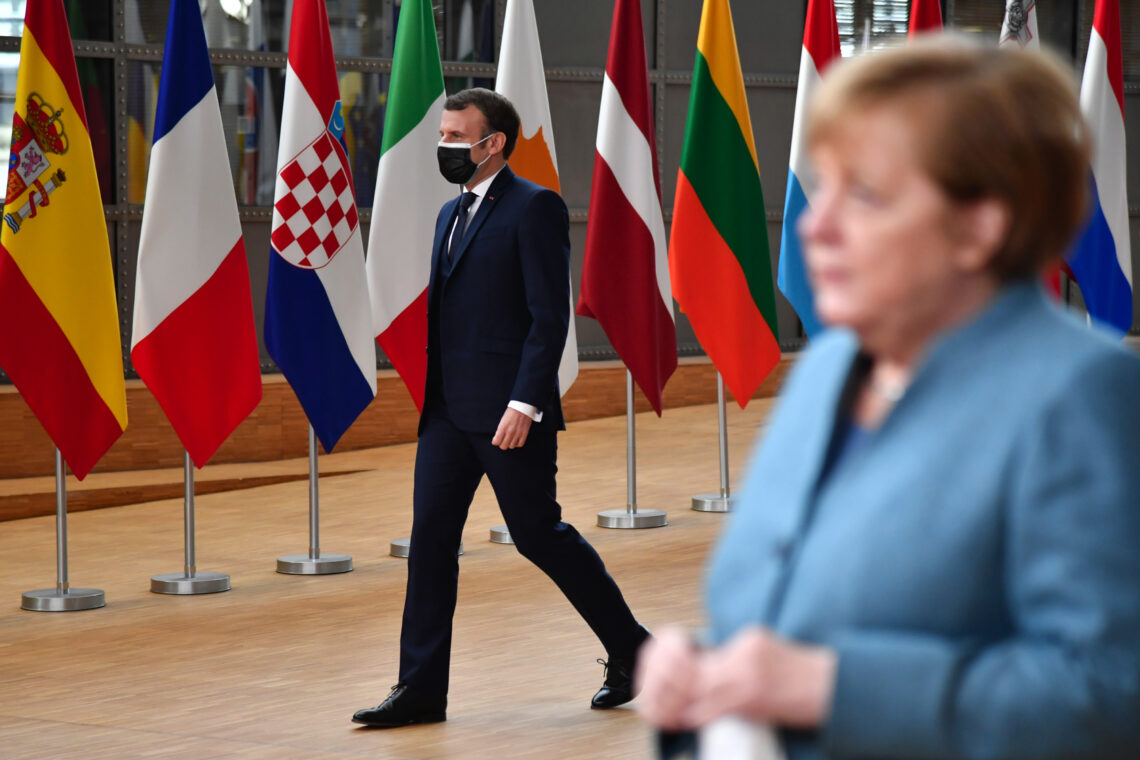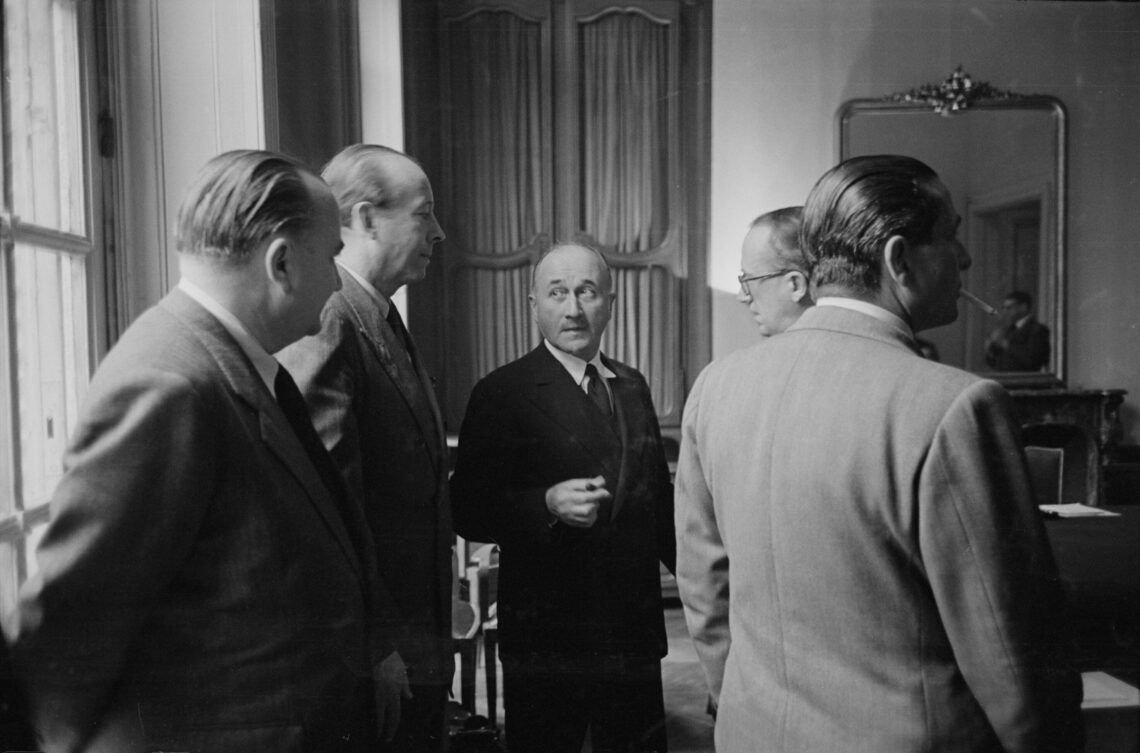Covid-19: Will the EU deliver or disappoint?
The European Union took bold initiatives in 2020 to fight the Covid-19 pandemic. Approving and implementing national recovery plans and building new relationships with London, Washington and Beijing will be high on the EU’s crisis management agenda.

In a nutshell
- The EU came together to face the pandemic health crisis
- Now, there’s a blame game over delays in vaccine supplies
- European leaders are hoping for closer transatlantic ties
This GIS 2021 Outlook series focuses on the opportunities that stem from the upheaval of the past year.
Euro-optimists see 2021 as the year of delivery, when the seeds sown in 2020 will come to fruition. In 2020, the European Union became a budding health union, with the collective purchase of Covid-19 vaccines and a vaccination campaign starting in late December. On the basis of a Franco-German agreement, the EU’s crisis management involved breaking the taboo against large joint debt issuance and fiscal transfers by authorizing the European Commission to borrow money for grants and loans to help repair the economic damage caused by the pandemic. Many heralded this as a breakthrough and Jean Monnet, the EU’s principal founding father, was much quoted as predicting that Europe will be “forged in crises.” But crises can also lead to breakdowns and the EU faces considerable downside risks in 2021.
A year of delivery
As a part of the EU’s crisis management it almost doubled its budget for the next seven years, bringing it to 1.8 trillion euros, including the recovery fund. These additional funds are intended to promote economic recovery, with spending focused on cleaner, smarter infrastructure. The EU proposed new digital legislation to facilitate and regulate data flows and to limit predatory practices by large technology companies, many American and Chinese. Fines could reach 10 percent of the revenue of a company found to have abused its market position.
In Brussels, such initiatives are viewed as steps toward “strategic autonomy,” a term first used in France in the 1970s. It was later adopted by the EU, signifying a greater capacity to act independently, with less reliance on others, especially the United States and China. It spans a wide field, from digital services and industrial policy to security and defense. Some see such autonomy as vital after the Trump presidency, expecting “America First” sentiment to persist despite the change of administration in Washington.
There are hopes in Brussels of coordinating the regulation of social media companies with Washington.
The EU bade farewell to the United Kingdom with the last-minute conclusion of a Trade and Cooperation Agreement (TCA) in December, providing for free trade in goods and, to a much lesser extent, services. Despite regrets over losing a large, influential member, EU officials viewed this as an opportunity to go ahead with initiatives that London would have opposed, like security and defense cooperation and the recovery fund itself. EU leaders expected the TCA, rather than a “no-deal” Brexit, to allow considerable continuity in trade in goods with the UK, despite new barriers.
In December, the Commission and High Representative for Foreign Affairs proposed an ambitious agenda for cooperation with the new and apparently more like-minded administration in Washington. Closer cooperation with the U.S. on trade, climate, regulatory issues, and geopolitics, especially relations with China, Iran, Russia, and the Middle East, are on the EU’s agenda for 2021.
There are hopes in Brussels of coordinating the regulation of social media companies with Washington, following increased awareness of serious regulatory gaps in the turbulent final phase of the Trump administration. The EU rounded out the year by concluding a Comprehensive Agreement on Investment (CAI) with China. This should give EU investors somewhat better access to a fast-growing 1.4 billion consumer market and allow them to compete on fairer conditions in China. But the agreement will have a rough ride through the European Parliament, where there are concerns about the balance of benefits in the CAI, Chinese labor practices, the lack of fundamental freedoms and repression in Hong Kong and Xinjiang.
Following Germany, Portugal has now taken over the rotating six-month presidency of the EU Council of Ministers and will be succeeded by Slovenia in July. The three countries have agreed on a rolling program, drawing on proposals from the Commission, other EU institutions and member countries. In 2021, the Portuguese presidency wants the EU’s crisis management to complete work on the recovery fund and budget, lay the foundations for a “green recovery,” tackle the epidemic’s social consequences and coordinate delivery of the vaccine.
Other priorities for 2021 are approving national recovery and resilience plans.
Other priorities for 2021 are approving national recovery and resilience plans and returning the Schengen open borders arrangement to normal operation, when the risk of contagion falls. On migration and asylum, the EU will try again to bridge the gap between countries of first arrival in the south and destination countries further north on the basis of a “pact” proposed by the Commission in November.
There will be a series of high-level conferences in the first half of 2021 including a “social summit,” a climate conference, a conference on economic recovery and separate EU summits with Indo-Pacific and African countries, and a spring summit with the U.S. The Portuguese presidency wants to launch the long-mooted Conference on the Future of Europe, originally a French proposal, that is intended to give citizens an opportunity to express their views on ways to strengthen the EU. Its opening has been delayed by the pandemic, as well as disagreements over who will chair the conference.
Risks and uncertainties
The year began with delays in the vaccination campaign, anti-lockdown riots in almost a dozen Dutch cities and a blame game over insufficient availability of vaccines. Germany, the Czech Republic and Cyprus apparently overstepped the boundaries set by the EU’s crisis management by seeking additional doses of vaccine for their own residents. Hungary chose to import vaccines from Russia and China. Serbia and other aspirants to EU membership in the Balkans, that are not covered by the EU’s procurement scheme, also asked Russia and China to supply vaccines. And a new, more contagious strain of the virus began spreading from the United Kingdom.
The Commission secured over two billion doses of vaccines from six companies for the 446 million EU inhabitants and later proposed to purchase an additional 300 million. But the rollout is slow because of production, distribution, planning and logistical difficulties as well as the multiplicity of pharmaceutical companies involved. Difficulties in supplying vaccines and a fragmented exit from lockdowns have cast shadows over the EU’s budding health union and economic recovery. The EU and other rich countries face warnings that they will not succeed in subduing the virus domestically while allowing it to spread abroad.
In January, concerns arose in Brussels that pharmaceutical companies might ship vaccines procured by the EU to the United Kingdom and other “third countries.” The Commission responded by adopting a “transparency and authorization mechanism for the export of Covid-19 vaccines” to prevent this. But these emergency export controls were widely criticized as harmful in the midst of an epidemic, likely to provoke retaliation and calling into question the EU’s claim to stand for solidarity and the rule of law. An initial draft of the measure, later rectified, stoked fears that it would require border controls between Northern Ireland and the Republic, endangering the peace established by the 1998 Belfast Agreement – safeguarded by the UK’s EU Withdrawal Agreement. This episode, as well as persistent vaccine shortages, raised questions about the EU’s management with the Covid-19 crisis.

The European economy should begin to recover in 2021, after an unprecedented contraction in 2020. But this depends on more stimulus spending, bringing down Covid-19 contagion through vaccination, and precautionary measures. High unemployment levels, rising income inequality and job insecurity will test the EU’s social cohesion. An increasing number of small and medium-sized companies find it hard to meet fixed costs and may face closure. Plans for spending recovery funds are due only in April and must be approved by the Commission. In Italy, the use of EU funds has become highly politicized and precipitated a government crisis in January, leading to efforts by Mario Draghi, former president of the European Central Bank, to form a government to fight the epidemic.
Some governments are tempted to scatter EU funds among politically motivated projects and may not manage to spend all their allocations. If the recovery fund is not targeted at its intended goals, especially cleaner and smarter infrastructure, and disbursed effectively, it will remain a once-off experiment rather than a decisive step toward the future use of “Eurobonds” and fiscal transfers.
The Portuguese and Slovenian governments, which chair the EU Council of Ministers in 2021 will find it hard to drive a coordinated exit from the crisis. Franco-German cooperation was essential to reaching deals on the recovery fund and Brexit last year. But in 2021, German politics will be dominated by the pandemic, the succession to Chancellor Angela Merkel and the general election in September. The French president, Emmanuel Macron, faces a difficult public health and political situation ahead of the April 2022 presidential elections. In this atmosphere, divergences are likely to grow between Paris and Berlin, and the Franco-German “locomotive” may run out of steam.
The French president persuaded the EU to endorse slogans like “strategic autonomy” and “European sovereignty” in the uneasy atmosphere surrounding Brexit and President Donald Trump’s disdainful attitude toward European allies. But the constitutional implications of the term “European sovereignty,” attributed to Mr. Macron, make German lawyers uncomfortable. With public debt swelling, the German government remains resistant to higher defense expenditures, while economic liberals in Germany doubt the wisdom of expecting state- or EU-sponsored industrial policy to create European champions.
Challenges ahead
Implementing the EU’s proposed new transatlantic agenda with the Biden administration will be a major challenge. President Biden welcomes the EU’s desire to rebuild transatlantic cooperation. But the EU’s ambitious agenda is rather Euro-centric and glosses over divergences with the U.S. Both Brussels and Washington, for instance, wish to rein in digital giants. But their cooperative spirit will be tested if European laws and courts call American companies to account. President Biden issued an executive order within days of taking office tightening “Buy American” rules for public purchasing by the federal government, causing consternation in Europe.
Threats to democracy in member countries will preoccupy the EU in 2021.
Europeans welcome the new president’s support for multilateralism, including for institutions like the World Trade Organization and the World Health Organization, as well as for the Paris Agreement on climate change. But other issues will be more difficult, like long-standing trade disputes, renewed U.S. involvement in the Iran nuclear agreement and American extraterritorial or secondary sanctions that affect Europe.
With the 2022 midterm elections on the horizon, President Biden will be ready to work with the EU when this helps address the concerns of disgruntled American voters, especially on jobs, reshoring and value chains. Trade, investment and technology will be high on Washington’s EU agenda. But European and American interests regarding China differ on trade and possible security threats. As one observer put it, President Biden will not be ready to eat from a menu drawn up by the EU.
In 2021, the EU will weigh closer concertation with Washington against its desire for greater autonomy. This dilemma was apparent in the EU’s decision to conclude the CAI with China in December 2020, after seven years of negotiations, without waiting to coordinate with the incoming U.S. administration.
In relations with China, Turkey, the Gulf countries, India, Brazil, Russia and aspirants to EU membership in the Balkans, the EU will try to achieve a balance between, on the one hand, the defense of fundamental values, like democracy, human rights, the rule of law and climate neutrality, and, on the other, what it calls “principled pragmatism.” It will try to overcome differences among member countries on relations with Russia, especially with the first two branches of the gas pipeline Nord Stream 2 due for completion by June, under threat of U.S. sanctions, and with the Kremlin’s harsh repression of protests against the arrest of opposition anti-corruption activist Alexey Navalny.. European governments will struggle to coordinate their position on China’s faltering Belt and Road Initiative and the EU’s Comprehensive Agreement on Investment with China, which awaits ratification.
Trying times
Threats to democracy in member countries will preoccupy the EU in 2021. Its tool kit for tackling rule of law problems inside the Union is almost bare, after the German presidency gave priority to keeping offending countries on board in the budget settlement last December. It will be hard, too, for the EU to agree to burden-sharing and faster procedures on migration and asylum, given divergent interests and political pressures.
In 2021, the numerous conferences and dialogues foreseen by the Portuguese presidency will be stronger on process than on substance. A case in point is the dialogue with Brazil on climate policy, despite record levels of destruction of the Amazon in 2020. The EU has given a cautious welcome to the Turkish president’s proclaimed desire to “turn over a new page” with the EU, after a year of tensions and clashes at sea in the Eastern Mediterranean. The Union will test Turkey’s willingness to cooperate on maritime delimitation disputes, migration, trade, security, human rights and negotiations for a Cyprus settlement.
The EU will also begin building a new relationship with the UK in 2021, but the dust from Brexit will take longer to settle. A British minister called for the two sides to reset their relations after the row over vaccine supplies in late January. The TCA concluded with Britain in December creates new administrative obstacles that are already being felt by countries that trade extensively with the UK, especially Ireland, Germany, France, Belgium and the Netherlands. They now have to enforce border checks on food and product safety, the origin of goods, and the payment of applicable taxes while trying to keep consignments moving. EU countries need to recruit and train additional customs and immigration staff, upgrade IT systems and port facilities and simplify procedures for traders and transport companies.
This will be a year in which the union strives to deliver on commitments the EU’s crisis management made in 2020. But 2021 will bring multiple risks.
The EU and the UK will take time to establish mutual trust before they are ready to explore cooperation on border facilitation, financial services, intelligence sharing, migration, asylum, China policy and other issues not covered by the TCA. Meanwhile, fighting Covid-19 remains the top priority and the drift of business from London to European financial centers and to New York and Chicago continues.
Britain has expressed little interest in security cooperation with the EU. But the mutual advantage in this, or at least in foreign policy coordination between Britain, France and Germany, seems self-evident. The same is true of coordination in the United Nations and international financial institutions. Still, this too may be postponed beyond 2021.
The UK will start diverging from European standards and regulations in 2021, leading the Union to consider retaliatory measures and ways to increase its own competitiveness. The EU and its members will seek to remove regulatory obstacles to internal trade, especially in the digital area, update labor law to reflect the shift to more precarious employment and find ways to safeguard the eurozone from future shocks.
Weathering the storm
This will be a year in which the union strives to deliver on commitments the EU’s crisis management made in 2020. But 2021 will bring multiple risks. Fighting the pandemic and promoting recovery will be overwhelming priorities.
The EU must navigate through a world of great powers, some of which are generally well-disposed, especially the U.S. under new management, while others, including China and Russia, pursue strategies that are at odds with European priorities. The foundations of democracy in the EU and beyond will need constant reinforcement. This is a year when internal and external shocks will reverberate, putting a premium on the EU’s crisis management capacities. It will be up to the EU’s de facto leaders, the German chancellor, the French president, and the Commission President to rise to the challenge of steering the EU through the storm.








